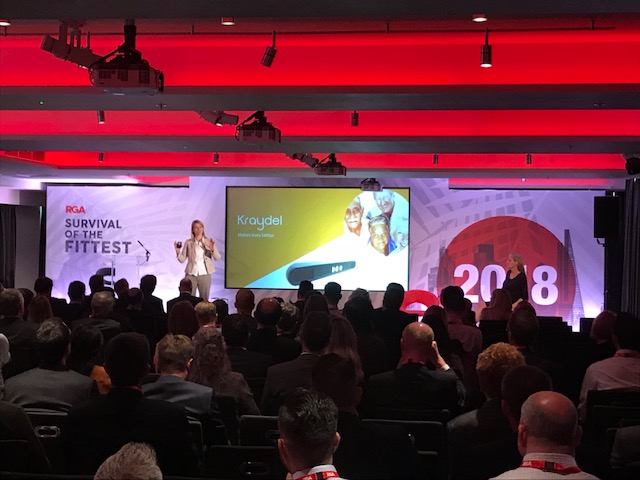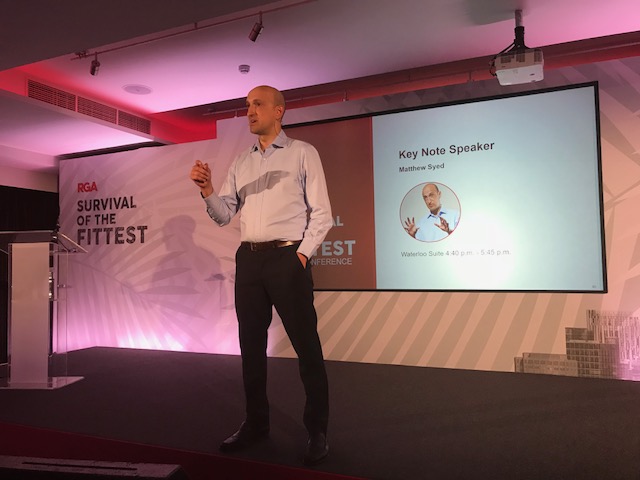UK Client Conference Report: Survival of the Fittest
Survival of the Fittest: To insurers, it can mean both triumphing over circumstances and the more mundane “better mortality through fitness.” At RGA’s most recent biennial EMEA client conference, “Survival of the Fittest,” held in mid-May, current longevity and mortality trends in today’s fast-evolving marketplace continued to be explored.
The well-attended half-day conference was held in newly designed space inside London’s beautiful County Hall, which until recently was the headquarters of London city government. Near to the heart of the city and close to the Thames, the building is also next to the London Eye, one of the city’s most visually prominent attractions.
The six information-packed sessions featured subject matter expert speakers from several RGA business units as well as from outside RGA. All focused on discussing the extraordinary discoveries and changes taking place in and around the industry – in the science of genetics, in investment strategies, in market needs, and in the products and services now increasingly necessary to serve today’s fast-evolving and highly competitive market. The more than 200 attendees also had their choice of two of the four excellent workout sessions, covering many of the essential issues confronting Europe’s insurers.
- Keynote speaker Tony Cheng, Executive Vice President, Head of Asia, RGA, kicked off the conference with his talk “Surviving the Asia Insurance Market,” in which he shared his thoughts and perspective on how innovation enhances opportunity creation and market-building, based on his more than 15 years of successfully positioning RGA Asia as the trusted reinsurance partner to help clients achieve their innovation goals. In today’s market, he told attendees, “Our strategy of having the next innovation ready to go requires more than excellent underwriting, actuarial, and marketing: it also means a real commitment to research and development, which means having robust, trustworthy data, top-notch data and behavioural scientists, and a truly collaborative culture.” Finally, he said, “We have to have courage: to choose what to do, whether it’s something we want or not, and ultimately, the courage to fail.”
- Peter Banthorpe, Global Head of Research and Data Analytics, RGA, and Dr. Richard Russell, Lead Health Data Scientist, RGA, began their workout session, “Survival of the Informed: The Risk of Anti-Selection in Protection Business from Advances in Statistical Genetics,” by introducing the results of recent ground-breaking research into polygenic risk scores conducted by RGA and Kings College, London. The research demonstrated how adding polygenic risk scores to conventional rating factors could significantly change predictions of disease risk. Polygenic risk scores condense information from thousands (“poly”) of genetic variants (“genic”) into a single score that can measure a person’s genetic predisposition to a disease or trait. For example, adding a polygenic risk score for cardiovascular disease was found to confer an approximately fourfold increase in risk for people with the highest 5% of polygenic scores compared to people with the lowest 5% of scores. A similar risk differential was observed when applying a polygenic risk score for breast cancer. Banthorpe and Russell discussed the impact of polygenic scores on critical illness and life insurance underwriting, focusing particularly on the potential for anti-selection if insurers cannot access client genetic information during underwriting. They emphasized that the use of genetic risk information remains an emerging risk for the insurance industry and a highly emotive subject for consumers. Insurers must continue to monitor and develop research on both the science and consumer sentiment on the potential impact. They also emphasized that genomic medicine will almost certainly lead to mortality and longevity improvements.
- The workout session “Mortality Improvements: How Long Will Your Portfolios Survive?” with presenters Stephen Courquin, Head of U.K. Actuarial Research, RGA U.K., and Dale Rotteveel, Vice President, GFS Pricing, RGA U.K, covered recent mortality improvement trends in the U.K., with a particular focus on an RGA analysis of national cause of death trends by socioeconomic group and their impact on the U.K.’s insured populations. The analysis produced useful outcomes that both substantiated much of the industry’s work to date and suggested further areas of investigation:
- All socioeconomic groups have had a reduction in mortality improvements since 2011.
- The most affluent cohorts experienced higher improvements than the average population, in recent and prior years.
- Socioeconomic differences have material impacts on pricing and reserves for insured portfolios.
- The recent slowing in mortality improvements in the U.K. cannot be attributed to any single cause. This suggests a broad-based driver, which fits with the U.K.’s currently struggling health and social care system.
- Care needs to be taken in allowing for differences in socioeconomic groups when modelling future trend assumptions.
- In the third workout session, “The Power of Evolution: Adapting to a Changing World,” Kate Gillmore, Commercial Director of RGAx EMEA, discussed the challenges faced by insurance industry innovators in developing and validating concepts and then bringing them to market. She also revealed Life Design Sprints by RGAx, a dedicated application of design thinking methodology that will enable RGAx to rapidly create, develop, test and launch innovative concepts. Kate was then joined by Dr. Lisa Smith, Chief Executive Officer of the start-up company Kraydel, which is focused on enabling a better quality of independent life for elders in the U.K. She talked about her transition from the structured corporate world to a start-up and her experiences as Kraydel’s founder and CEO (full disclosure: RGA is an investor). She explained how she believes large corporations have much to learn from more agile start-ups and the opportunities that exist to work together.
- The fourth workout session, “Deferred Annuity Reinsurance: Emergence of a New Species,” focused on this growing market and its needs. In the U.K. market, capital efficiency has been the mantra of the post-Solvency II world, especially when it comes to capital-intensive business lines such as deferred annuities. Presenters Cormac Galvin, RGA Senior Vice President, Business Development, U.K. and Ireland, and David Lipovics, RGA Senior Business Development Actuary, GFS, U.K. and Ireland, discussed how U.K. life insurers in the bulk annuity space are targeting the market for pension schemes that have an increasing proportion of members who have yet to reach retirement age. This is creating a growing demand for reinsurance solutions that cover the risks associated with deferred lives. In response to this demand, RGA has developed several structures that cater to the needs of these clients, ranging from short-term capital management to a more holistic management structure that incorporates capital and capacity management. Galvin focused also on highlighting how reinsurance support can enhance an insurer’s competitiveness when bidding for pension scheme business in what has become a fiercely competitive market.
- The afternoon’s closing session featured author and high-performance specialist Matthew Syed. Syed is also a former international table tennis champion, and in his talk, titled “Black Box Thinking – High Performance in a Complex World” (based on his recent book “Black Box Thinking”), he discussed the latest thinking on growth mindset, the critical role marginal gains play in creating a high-performance culture, and the true value of gaining success by confronting and learning from mistakes.
The attendees’ judgment of “impressive,” “insightful” and “thought-provoking” information provided by the afternoon’s sessions validated RGA’s mission of sharing the best of our thought leadership with our clients and the industry. We look forward to seeing all of you at our next client conference!




